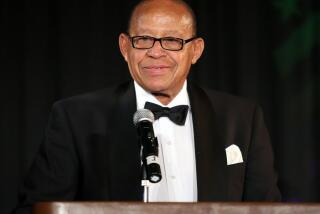Richard Ellison, 80; Producer’s Vietnam Series Won Emmys
- Share via
Richard Ellison, a television producer best remembered for his controversial Emmy Award-winning 13-part documentary about the Vietnam War, has died. He was 80.
Ellison died Friday at his home in Kingston, Mass., of a neurological disease known as diffuse Lewy body syndrome.
The landmark miniseries “Vietnam: A Television History” was telecast in 1983, eight years after the war ended, and sparked emotions still sizzling from that long military and political involvement in Southeast Asia and at home.
Executive director Ellison and Pulitzer Prize-winning journalist Stanley Karnow traveled the globe, including two trips into Vietnam in 1981, delving into archives and interviewing officials and citizens to compile the history of Indochina from the 1940s through the U.S. withdrawal in 1975.
“I hope that it makes people thoughtful,” Ellison told The Times in 1983, “thoughtful about how complicated the past is, about how allegiances shift, about how viewpoints change.”
The exhaustive documentary was six years in the making -- half spent raising the $4.5 million in production costs. Ellison and WGBH-TV in Boston partially achieved the financial goal by arranging co-production deals with television companies in France, England and Sweden.
After it aired, the series earned critical praise and two Emmys for Ellison, and half a dozen Emmys for the miniseries, plus a George Foster Peabody Award, a George Polk Award and an Alfred I. DuPont-Columbia University Broadcast Journalism Award. The series was viewed by about 9% of U.S. households, a high rating for PBS.
Some conservative groups, however, considered the series overly sympathetic to the North Vietnamese. They complained so vociferously that PBS took the unusual step of broadcasting a two-hour rebuttal in 1985 called “Television’s Vietnam: The Real Story.”
Half of that program consisted of a documentary narrated by actor Charlton Heston and produced by the group, Accuracy in Media. The other half, produced by PBS, was an interview with Ellison and a panel discussion about media coverage of the war.
Echoing television commentators around the country, The Times’ then-TV critic Howard Rosenberg praised Ellison’s work for its “impeccable fairness and objectivity” but also said the program was dull.
“You appreciate the straightforwardness and objectivity, the uncompromised integrity, the unwillingness to distort history for the sake of entertainment,” he wrote. “But how long can one endure a musty archive.... Much of it is arid and sterile, with heavy reliance on talking heads and a soft-voiced narration that leaves you heavy-lidded.”
Ellison had attracted widespread attention for another controversial documentary, “Choosing Suicide,” broadcast in 1980. A dozen PBS stations refused to run the documentary, fearing it would encourage suicide.
Ellison edited the one-hour program from 19 hours of videotaped interviews with his friend, artist Jo Roman, who had breast cancer. Roman, describing her action as “a rational and artistic option,” took a fatal overdose of Seconal in 1979.
“She won her argument -- she took her life. But I would not say the piece advocates her position,” Ellison told the Associated Press at the time the documentary was shown.
The program was nominated for an Emmy.
Born in Lansing, Mich., Ellison joined the merchant marine at 17 and served as an officer during World War II. He wound up in New York City, where he attended City College, worked as a gaffer in films and wrote pulp fiction detective novels.
His first job in television was in the CBS promotion department. He eventually moved up to producer, on such shows as “CBS Reports,” “Bandwagon” and “Look Up and Live.”
Ellison later became director of current affairs programming for PBS.
Divorced from his first three wives, Ellison is survived by his wife of 23 years, Sara Altherr; a son from an earlier marriage, Jib of Healdsburg, Calif.; a stepdaughter, Petra Reitz of East Bridgewater, Mass.; a brother, James of New York City; a half-brother, Raymond, of Lansing; and two grandchildren.
More to Read
The complete guide to home viewing
Get Screen Gab for everything about the TV shows and streaming movies everyone’s talking about.
You may occasionally receive promotional content from the Los Angeles Times.






